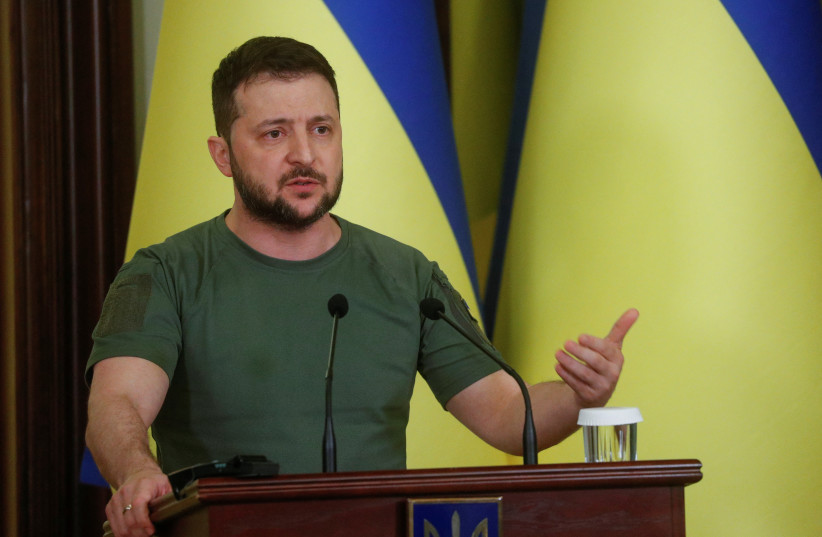We welcome the High Court of Justice ruling on Sunday that abolished Interior Minister Ayelet Shaked’s decision to restrict the number of Ukrainian war refugees entering Israel.
After Russia invaded Ukraine on February 24, Shaked – backed by the government – announced that Israel would allow some 20,000 Ukrainians already here either on tourist visas or illegally to remain, as well as grant visas to a further 5,000 refugees who do not qualify for aliyah under the Law of Return.
The court rejected the state’s argument that those who come to Israel on a three-month visa would overstay their allowed time, noting that 4,409 Ukrainians who had entered Israel since the war broke out had left by May 8.
The court said that changing current regulations, under which Ukrainians do not require a visa to come to Israel, would require legal action by the Knesset and its committees. At the same time, it stressed that the ruling does not harm the interior minister’s authority to decide who can enter the country under the provisions of the law.
The petition against the immigration quota was presented by the Tomer Warsha law firm, which specializes in immigration law and has been helping Ukrainians enter the country.
“We are very satisfied that the High Court accepted our claims and ruled that the interior minister acted against the provisions of the law,” Warsha said in a statement. “We are happy that Ukrainian citizens, who are still at war, can find quiet in Israel alongside their family and friends.”
“We are happy that Ukrainian citizens, who are still at war, can find quiet in Israel alongside their family and friends.”
Tomer Washa law firm

In an unusual move, Ukrainian President Volodymyr Zelensky praised the High Court decision in a tweet shortly after the ruling was announced. “I commend the decision of the Supreme Court of the State of Israel, which obliges the government of Israel to abolish any additional restrictions on the entry of citizens of Ukraine,” he wrote. “The rule of law and respect for human rights is exactly what distinguishes a true, developed democracy!”
Shaked is livid
Shaked was predictably livid, calling a meeting of the Knesset Interior Committee to discuss the court’s ruling. She said that her policy had proven to be a success, enabling relatives of Israelis to come here and work, while “preventing an unprecedented flood” of refugees.
“In recent weeks, thanks to this system, more Ukrainians are leaving the country than arriving,” Shaked said. “Unfortunately, the High Court has ruled, practicing extraordinary judicial activism... this system will be halted if it isn’t discussed in the Knesset. It is clear that we can’t allow the unlimited entry of foreign citizens, while we don’t know whether and when they are going to leave.”
Shaked’s concerns are somewhat understandable and stem from a desire not to have Israel allow entry to everyone who wants to come here. Just as other countries, including the US and UK, put caps on their immigrants, so must Israel.
But the Ukrainian situation is unique, as are their refugees. As Diaspora Affairs Minister Nachman Shai said, the High Court ruling “embodies our moral duty as a Jewish nation and state.”
Shai said, “From the very beginning, I have fought to allow the entry of Ukrainian refugees without the strains of bureaucratic barriers. I welcome this decision made in favor of humanity and in line with our ethos as a people.”
Former Mossad director Tamir Pardo, who has joined the Jerusalem-based Jewish People Policy Institute, spoke in a similar vein when he addressed a conference last month titled “Ukraine: Moral Considerations in Israel’s Foreign Policy.”
Addressing the issue of Israel’s treatment of Ukrainian refugees, Pardo referred to the way Switzerland and other countries, including the US and UK, refused to allow Jewish refugees to enter during the Holocaust.
“If today, Israelis believe it’s moral that we differentiate between Ukrainian Jewish and non-Jewish refugees, we have a problem,” Pardo said. “Israeli policymakers do not side with Ukraine and the Israelis are indifferent. Our treatment of Ukrainian refugees is a shame and disgrace.”
The High Court’s ruling conforms to the basic principles of Judaism, justice and Israel itself. In Genesis, Abraham and Sarah teach us to offer hospitality to strangers. Their tent was open on all four sides to allow anyone needing rest and shelter to enter. Israel was created, inter alia, as a haven for Jewish refugees. Today, as refugees from Ukraine – Jews and non-Jews – seek refuge, we must open our gates and our hearts and let them in.
